Steve Hackett 2018
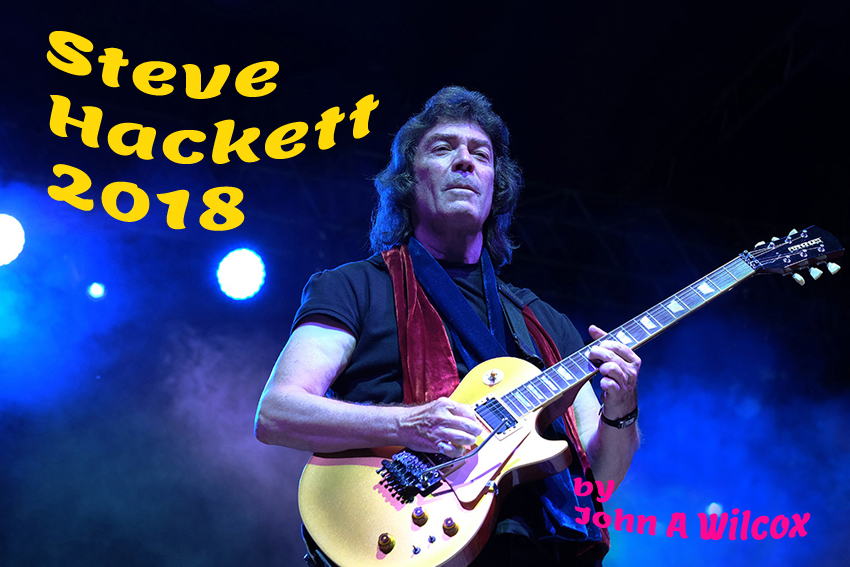
by John A. Wilcox
2018 is already a busy year for our dear Steve Hackett. He has a new live set called Wuthering Nights: Live In Birmingham. He recently played the Cruise To The Edge to fantastic reviews. He's currently touring the globe with his Tour De Force. On top of all that he's already at work on a new studio album. Despite all of that, he took the time to talk with Progsheet...
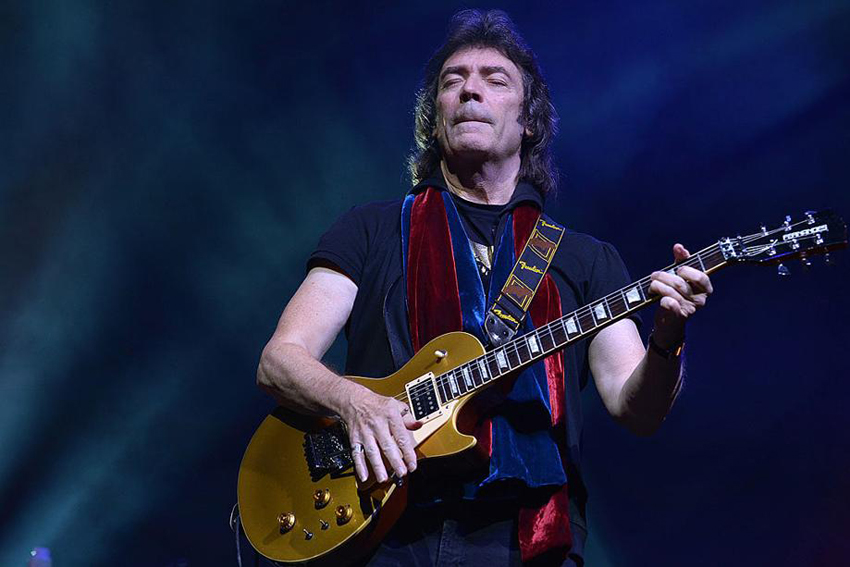
PS: I understand you have brought Jonas Reingold from the Flower Kings into the band on bass. How is he fitting in?
SH: Now this is very interesting. We've been 2 weeks in rehearsal with him. First of all, on day 1 he basically got all of the stuff, all of the parts absolutely correct. There's a sound. There's an attitude. There's a personality. He is a huge Jaco Pastorius fan and he manages to combine this kind of incredible fretless sound with an extraordinary Rickenbacker sound. A kind of iron girder sound beloved by players of those sort of basses. I'm thinking first and foremost my late great pal Chris Squire.
So he brings a lot of things to it. I've also heard him play Bach on the bass. He plays the Cello Suite No. 1. The thing I based Horizons on. He plays it on the bass. It sounds amazing. It was written for the cello first of all. Beyond that he's just so quick on the uptake and you know that he's absolutely solid on the stuff. He's really pushing himself to try and get the parts right and the vocal parts and everything. It's an absolute plus for me that he's able to do that. In fact, he covered so much of the material so early on that I said we should look at some other songs. Some "revolving door" songs that we can use in the set as and when we feel like it so we can vary things and keep it interesting for the players. In that spirit I will do more and more things hopefully. If we get time at sound check I can say let's try this, let's try this, let's try this. Let's go for it.
PS: Will he be playing guitar as well?
SH: Oh yeah. He'll be doing that as well. A variax. 12 string. Double neck. Bass pedals. The whole thing. I think Mike Rutherford really kicked off this idea of someone who is half a bass player / half a guitarist. The mixture of 12 string and bass and to be able to switch between the 2. That's something I think that Mike Rutherford pioneered and is an essential part of doing many of these early Genesis tunes.
PS: What new material is being feature on this tour?
SH: Please Don't Touch was the first album I did after Genesis in '78. We do a couple of things from that. The instrumental that was the title track, which was very fusiony without intending to be fusiony. It's just something that charged along fast and furious that had a sort of elemental quality to it. There's not a lot of fast playing on it, but it's that propulsion from the drums and the bayong rhythm, and then the Oriental harmonies of that. Then the aspect of the 5/4 which I owe in a sense really to Take Five by Dave Brubeck. I wanted to write something that had that sort of bright breezy kind of thing with the aspect of jazz at its most melodic.
One of the Richie Havens songs - The first one that he sang with me all these years ago - Icarus Ascending. Nad does such a great version of that. He really can sound like that great man at times. That's truly wonderful when he does that. So there you go.
When The Heart Rules The Mind. We're definitely going to do that from GTR. I think that was the strongest song. There's some very good stuff from that, so I'm going to embrace that and see what the audience reaction is to doing the GTR idea. If that works, who knows where that might lead? We'll see! I'm looking forward to doing that tremendously.
We'll also be doing from 1972 from Foxtrot we'll be doing Supper's Ready in its entirety. I'm not just doing a nod to these things. I'm trying to give people at least the length of the original and to enlarge the shoes a little bit of the original and take it to the mountain with the play out. I think it's something that really requires me to make the guitar do something surprising on it.
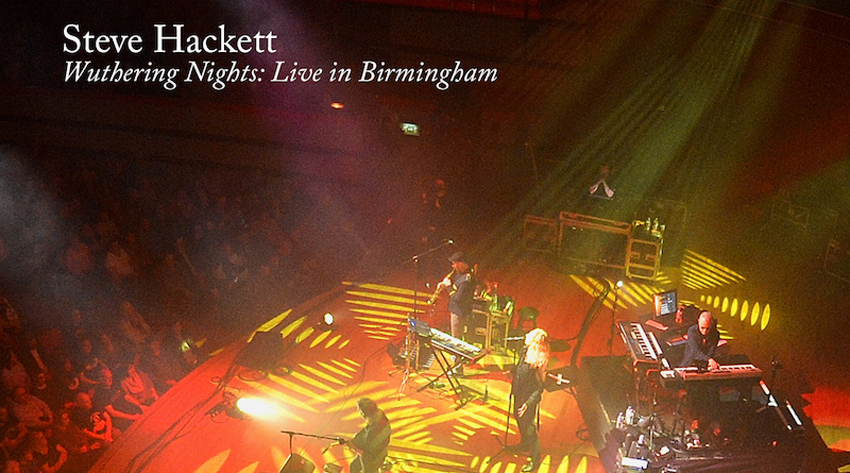
PS: Any acoustic material planned?
SH: At the moment I'm not doing any acoustic stuff. But it's relatively easy for me to pick up a nylon guitar and do something with that. Or to do something as a trio, because at the drop of a hat we're able to do certain things as an acoustic trio that also sounds a little bit like a chamber orchestra. By the time you've got these guys on it - Roger King and Rob Townsend - Even if it's 3 of us playing acoustic instruments there's something quite extraordinary about it. So I look forward to doing that, absolutely!
PS: You recently released the CD/Blu-Ray combo Wuthering Nights: Live In Birmingham. Was it taken from the later end of the last tour?
SH: I think it was. I think that we'd been playing that for quite a bit. By the time we did Birmingham - the symphony hall there - I think it was very well drilled in by then. We were a crack regiment at that point. When we first started off playing that entire set there was a lot that was not instinctive. Certain tunes were very difficult to pull off. You just have to be so on top of the changes. The tap dancing that guitarists do with their various pedals. You have to be able to get those things right before you can take things on to another level. By the time we were doing the Birmingham show we'd gotten above the sustenance level and we were into being able to tweak those performances and take them to another level.
PS: I see that you'll be doing a series of dates in the UK with orchestra in the last quarter of 2018...
SH: I'll tell you how it came about. When we were playing a gig in North Tonawanda, which is a lovely little theatre - extraordinary place - in the Buffalo area, we were approached by the Buffalo Philharmonic Orchestra in the shape of Brad Thachuk, who conducts them, and his brother Steve who does arrangements. They work very closely together. He said "How do you feel about working with the orchestra?" I thought oh well, you know, they're probably just joking and this is not going to happen. And then it started to coalesce and we did a show in front of about 2000 people with the Buffalo Phil and Brad conducting. It went so well and it was so natural. I suspect because a lot of this material was already symphonic in spirit so adding an orchestra just gave it more and more authenticity.
I had an idea of doing a show at London's Royal Albert Hall where I played a few years earlier. I thought "To make it special, make it a gala evening why don't we have an orchestra?" Agents and promoters in England came back with an offer of 6 shows up and down the country and into Scotland. I thought "Is this feasible? Am I dreaming here?" So we've all decided to run with the ball. We liked working with Brad so much. He was so natural and was such a personality in his own right. He communicates so much enthusiasm. I think the audiences will adore him. So we're doing that in the UK and it looks like these dates, which have just been announced, seem to be selling like hotcakes already. The wonderful thing is that if it comes off it may be possible to do it in other areas; in other countries. I hope we can eventually bring the idea here. We just have to see how it goes, because obviously we have to make numbers work for this sort of thing. But in my heart that's exactly what - all that I wanted Genesis back in the old days to do. To follow the path of the Beatles in a sense which was take this music that was often very influenced by classical stuff, theatrical stuff, as I said - symphonic in nature - and give it the clothes that it deserves. The ermine cloak that is the orchestra. Give it the regal effect. We do that as much as it is possible with electronic instruments and samples and what have you and that can sound pretty damned lush. But there's something about all those people on stage giving it their all. So I'm looking forward to seeing how those 6 dates come off with this combination. It'll be band and orchestra. Group and orchestra.
We're going to do the Royal Festival Hall in London. Which is on London's South Bank. I believe it will be a show worth driving for. It's a huge undertaking and a huge experiment. I'd be lying if I didn't say to you I'll get butterflies in the stomach from this. I think that everything flies. Hopefully in formation. The element of risk and being able to take songs that are much beloved in the first place - the kind of emotional evolution of that appeals to me greatly. The idea of taking these tunes and giving them the priority that they deserve and saying to people something that many fans have said for a very long time - this is the classical music of the future. Once the charts are done - because the harmonies are so complex. Because the music was so through composed in the first place. It's music that appeals to classical players like Joshua Bell and many more. Guys like Nigel Kennedy have been aware of us. Even Yehudi Menuhin when he was alive. It's great to have the ear even for 5 minutes of people of that level of proficiency distinction. Genius.
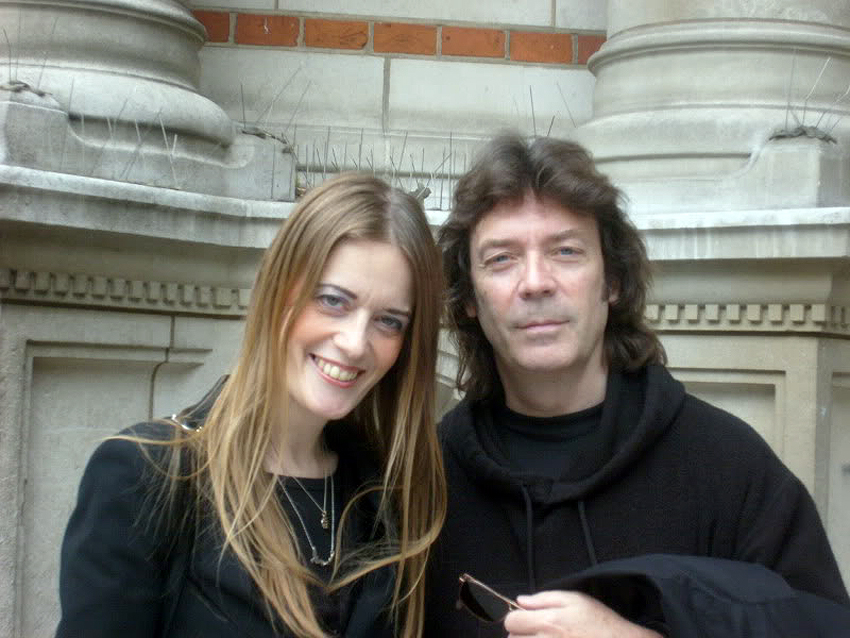
PS: Several decades ago you told me that a change is as good as a rest. Do you still feel that way?
SH: I think change is important. It's nourishing. The element of risk, to make risk your friend rather than your adversary. It needs that to shake things up from time to time. So to listen to people who are working in unfamiliar places and genres is all important. My wife Jo and I just returned from India. We had a wonderful trip visiting temples that were carved out of mountains and the most extraordinary stuff. Also encountering music there. They have demon drummers and percussionists. I'd never heard anything like it in my life. Stuff that sounds electric. Something that would thrill any rock drummer listening to this stuff. Highly developed sense of rhythm. Tremendously exciting. I'm not just saying that to be politically correct. I was blown away with this stuff. When I heard it, it made me want to move. My body just started rocking backwards and forwards. I was absolutely there and wanted to be part of that. I wanted that to be part of what I do, so in the future I think there will be an aspect of that. It's quite hard when you're writing stuff and you're trying to leave whole tracks of things for real players to do as you're mapping out your roughs on your computer and what have you. That's what we do. We kind of do an electronic sketch and we fill it in with more and more real things as time permits and as personnel becomes available.
PS: I sometimes feel it's in the DNA. A sort of generational sense of rhythm...
SH: That's probably the case. I don't know how it works because we don't speak the same language either verbally or indeed how they perceive in another sense. But I recognize the same spirit that goes through these different forms. They've got a way of making things charge along that makes you go"Oh my God! What I want is this plus this plus this." If only I knew that that could be done. How I could drive it. Like bottled lightning, really. Just extraordinary stuff. Completely thrilling. Completely different to rock, but still as elemental and urgent. I run out of words for it. I really wish you could've heard what I heard when I was in India. I'll try and bring some of that to the plot of the new stuff. I'm halfway through a new studio album and I've got to get an aspect of this into it.
PS: Will Jonas play on that as well??
SH: I hope so. I've already fallen in love with his playing so I certainly hope he'll be part of that. He's a funny guy. Very self-effacing and that's part of his humor.
PS: I always associate you with the Les Paul. What is the attraction?
SH: I had work done on my Les Paul by a guy called Phil Joyner. He re-fretted it and changed some things. He said "Let's take those extra magnets out of the pickups because they just serve to cut down the sustain." Everyone thought that it would make it more powerful, but that was kinda seventies thinking. He took them out and the thing absolutely sings like a demon. When you vibrato a note on it, it's got a whine to it that sounds a little bit like a souped-up violin. There's a track funnily enough on The Night Siren called In Another Life. Right at the end the guitar is the Les Paul. I say that because I sometimes use a Fernandes which has a Les Paul shape and has got the sustainer pickup in it. That's got a great cry to it as well. But the Les Paul is an extraordinary guitar. It's very, very beautiful.
I really first heard the Les Paul when I heard Eric Clapton working with John Mayall in the mid-sixties. That wonderful "Beano" album - the 1966 album where most of my rock guitar pals agree that it's Eric Clapton's finest blues guitar playing. Whatever he thinks about it himself, the consensus amongst the listeners - we like to think we're the true owners of that. A lot of us fell in love with that. At the time it seemed like every guitarist that worked with John Mayall - Eric's successor Peter Green and Mick Taylor - they were all using Les Pauls. Sounded wonderful. Jeff Beck was using a Les Paul. That was enough for me. I was just sold. Of course I had no idea that when I would eventually acquire one how heavy those things were and don't drop it on your foot or you could be dancing or hopping to a different tune! There's something about the thrill and the feel of it. Mine's got an action like butter. I persist in using very light strings and it means that I can get a vibrato like none other.
PS: What gauge?
SH: It's 8s. I use a set of 8s. I know a lot of people think that's erroneous but I had a hand injury some years ago. I need to have very light strings to do what I do. You've got to have what works for you. I have the lightest touch. In order to be able to fly around I need to be able to put as little effort into it as possible so I can reach all ends of the fretboard at once. All ends of the universe simultaneously. I need to be able to access at the speed of light and beyond to be able to do what I do. It's a wonderful beast.
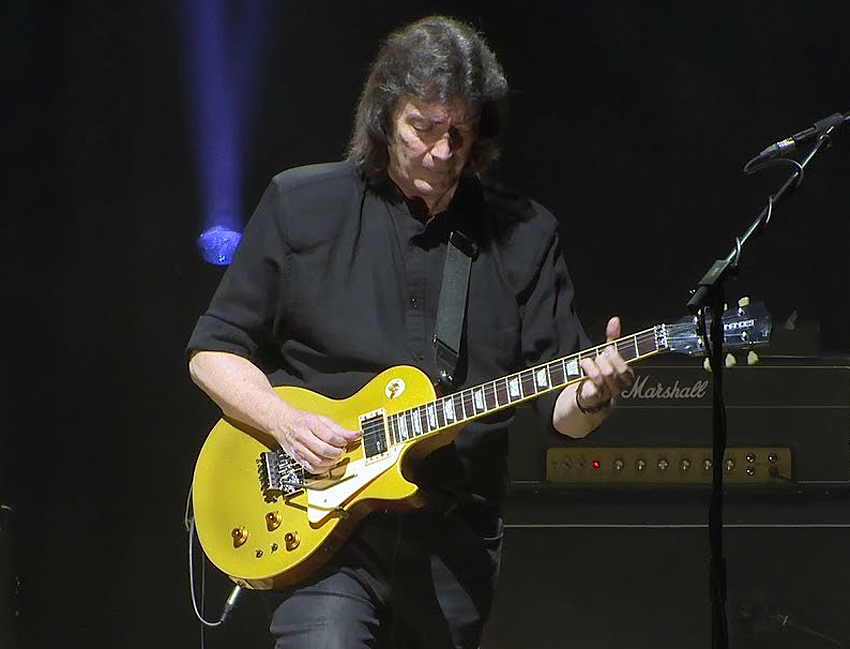
###
Table Of Contents
Contact





